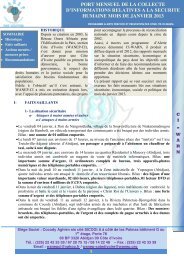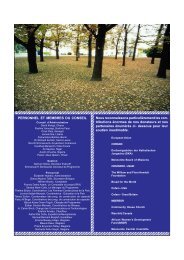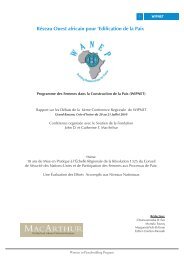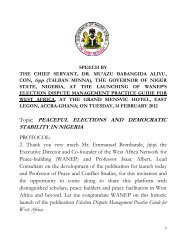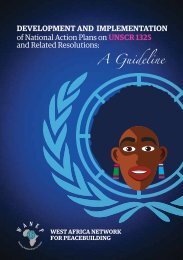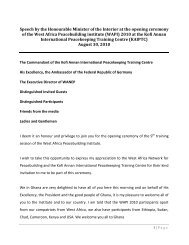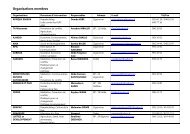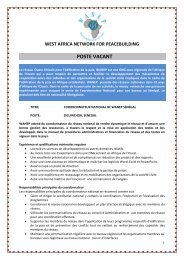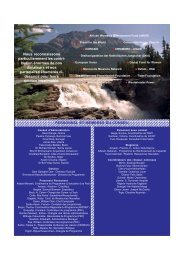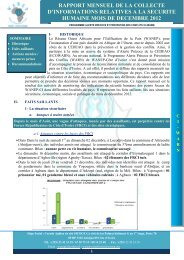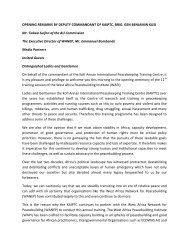You also want an ePaper? Increase the reach of your titles
YUMPU automatically turns print PDFs into web optimized ePapers that Google loves.
<strong>WARN</strong> <strong>POLICY</strong> <strong>BRIEF</strong><br />
NIGER DELTA CRISIS<br />
ENDING THE NIGER DELTA CRISES: EXPLORING WOMEN’S PARTICIPATION IN PEACE PROCESSES<br />
Author(s): Chukwuemeka Eze, Bridget Osakwe, Bukola Akosile, Evelyn Mere<br />
Editor/quality assurance: Takwa Zebulon Suifon and Ifeanyi Okechukwu<br />
Address enquiries to: National Network Coordinator, WANEP-Nigeria, 3, Soji Adepegba Close, off Allen<br />
Avenue Ikeja, Lagos, Nigeria. Tel/Fax: 234-1-5556805, 8198282 (website: www.<strong>wanep</strong>nigeria.org)<br />
………………………………………….WANEP © 2009………………………………………………………...<br />
1. INTRODUCTION<br />
August 15, 2009<br />
WEST AFRICA EARLY <strong>WARN</strong>ING NETWORK (<strong>WARN</strong>)<br />
The Niger Delta question predates the<br />
independence of Nigeria and has continued<br />
to stick out like a sore thumb in the nation.<br />
The present administration’s renewed<br />
search for an effective solution to this<br />
protracted problem is based on the fact that<br />
it is part of President Yar’Adua's Seven<br />
Point Agenda, and thus a critical index in<br />
measuring the success of the administration<br />
as well as the country's march towards<br />
Vision 2020. The strategic importance of the<br />
Niger delta to the socio-economic well being<br />
of Nigeria can never be over emphasized;<br />
the creeks and swamps in the region sit on<br />
one of the world’s biggest oil reserves with about 54 billion barrels of oil. The oil explored<br />
in the region accounts for over 85% of government revenue and 95% of the nation’s<br />
foreign exchange 1 . In addtion, the World Bank has reported that the region has the tenth<br />
largest proven gas reserve in the world. 2<br />
However, the country’s continued dependence<br />
on oil and gas revenues generated from this region strikes at the core of stability for the<br />
nation. Moreso when the full implementation of the 2009 budget is already affected by<br />
The West Africa Early Warning Network (<strong>WARN</strong>) is an<br />
integral part of the West Africa Preventive Peacebuilding<br />
Program co-ordinated by the West Africa Network for<br />
Peacebuilding (WANEP). Through its <strong>WARN</strong> Program,<br />
WANEP is setting the stage for a civil society-based early<br />
warning and response network in Africa with emphasis<br />
on human security.<br />
<strong>WARN</strong> covers the entire Economic Community of West<br />
African States (ECOWAS) sub-region including<br />
Cameroon and Chad. Our focus was initially the Mano<br />
River Basin countries of Sierra Leone, Guinea, Liberia,<br />
and Côte d’Ivoire. We have since expanded to cover the<br />
entire West Africa sub-region.<br />
Since 2002, WANEP entered into an agreement with<br />
ECOWAS through the signing of a Memorandum of<br />
Understanding (MOU) in the framework of capacity<br />
building in Conflict Prevention. One of the goals of this<br />
agreement is to interface <strong>WARN</strong> with the ECOWAS Early<br />
Warning Systems to optimize early warning conflict<br />
prevention in West Africa. In view of this development,<br />
WANEP has been operating a liaison office located at the<br />
ECOWAS Secretariat in Abuja, Nigeria since April 2003.<br />
1 UNDP Human Development Report, 2000-2001 Millennium edition.<br />
2 Tunde Obadina, “Nigeria Alone Could Provide the Power Needs of All West Africa”,<br />
from Africa Recovery, Vol.13 #1 (June 1999), page 16 (part of article, “Nigeria in Focus”)
shortfall in revenue from oil production as result of militancy in the region.<br />
A common root cause to the instability revolves round the issue of resource control and<br />
socio economic development of the region. However the plight of indigenous women in<br />
the face of intractable violence has largely been ignored. The just suspended armed<br />
engagement between the Joint military Task Force and various militant groups in the<br />
region has created several negative consequences for women and children which is<br />
subsumed under the bigger issues of violence. This policy Brief explores recent<br />
dynamics in the Niger Delta conflict in the context of the amnesty granted to militants,<br />
release of Henry Okah and the plight of the vulnerable groups in all the efforts geared<br />
towards resolving the conflicts. This paper attempts to bring the ‘women perspectives’<br />
into the fore of events in the region. This brief specifically:<br />
� Analyzes the recent violence and its impact on women and children;<br />
� Critically examine the roles of different social groups in the life of the conflict;<br />
� Highlights women not just as victims but as a group with the capacity to make<br />
both positive and negative contributions to the dynamics of the conflict;<br />
� Explores the accelerators as well as resources for peace; and finally<br />
� Proffers options for response.<br />
BACKGROUND TO THE CONFLICT:<br />
The upscaled military action of the Joint Task Force in Gbaramatu Kingdom of Delta<br />
State on May 13, 2009 in response to the alleged killing of an army officer (a Lt.Colonel)<br />
and the attack on eleven others by Militants in the region highlights part of the tragic<br />
history that has befallen the Niger Delta since the discovery of oil in the region in 1956.<br />
A timeline analysis shows that as early as as 1966, Isaac Adaka Boro embarked on a<br />
twelve day revolt in 1966 to protest inequality and injustice experienced by the minorities<br />
in the Eastern region of Nigeria. His revolt kickstarted the chain of various degrees of<br />
violent protest which over the years was suppressed by the military government.<br />
A significant turning point to the struggle was the formation of the Movement for the<br />
Survival of the Ogoni People (MOSOP) inspired by Ken Saro Wiwa in 1990 to protest<br />
the environmental degradation. In response the military government of General Sani<br />
2
Abacha set up the Rivers State Internal Security Force to ‘deal with’ them as he<br />
considered their actions as an uprising. The subsequent violent abuses and political<br />
intrigues led to the death of Ken Saro Wiwa and indigenes of Ogoni land. Another<br />
significant threshold in the historical timeline was in 1999 when the Federal Government<br />
under the leadership of Chief Olusgegun Obasanjo ordered a military engagement to<br />
the village of Odi in response to percieved acts of violence by restive youths in the<br />
community. During the onslaught, women and girls were brutally raped and killed by the<br />
military officers and subsequently displaced without provision for trauma healing,<br />
reintegration and reconciliation.<br />
With the turn of the new millenium the agitation took a worse distabilising dimension as<br />
clusters of youth groups organised themselves into militant groups to violently agitate<br />
and seek for various group interests often coated with a facade of regional or communal<br />
positions. Groups such as the Niger Delta Volunteer Force and the Movement for the<br />
Emancipation of the Niger Delta (MEND) embarked on campaigns of sabotage,<br />
destruction of oil installations, kidnapping/hostage taking for ransom and oil bunkering.<br />
These acts have had devastating effects on the country’s economic performance,<br />
causing huge loss of petroleum output and revenue. At present, more than 1 million<br />
barrels per day are lost to shut in and force majure by oil multinational companies while<br />
not less than USD $500 billion have been lost in the five years. Kidnappers and hostage<br />
takers have also reportedly pocketed over $100 million between 2006 and 2008 alone<br />
from the over 128 persons kidnapped during the period 3<br />
. The victims of these kidnap<br />
incidents moved from men to include women as mothers, wives and very young<br />
daughters made victims due to their relationship with targeted men. At one stage, the<br />
kidnappers diverted their attention to kidnap of little girls; for whatever motive but the<br />
effects were traumatizing for their families especially mothers of the kidnapped children<br />
and other mothers who are gripped with fear of safety of their own safety and that of<br />
their children.<br />
The JTF otherwise referred to as Operation Restore Hope has been the most recent<br />
military response by the Federal government to the militia activities and criminality in the<br />
Niger Delta. Composed of the Nigerian Army, Air Force, the Police (MOPOL) and State<br />
Security Service and deployed in the Niger Delta Region in August 2003, it was tasked<br />
3 ‘Kidnappers pocket N15bn’, Thisday Newspaper, Wednesday April 1, 2009 pg 8:<br />
3
primarily with securing the region from total descent into anarchy.<br />
The 13th May 2009 military bombardment of ‘Camp 5’ regarded as MEND stronghold at<br />
Oporoza in Gbaramatu Kingdom of Delta State has also sparked off incursions into other<br />
communities in the Kingdom with suspected militant operations such as Kurutie,<br />
Kokodiagbene, Kunukunuma, and Okerenkoko communities.<br />
With the upsurge of violence in the region, national and international attention has been<br />
focused on the level of human rights abuses as result of militant and military activities in<br />
the region. However, little attention has been placed on a group considered as the most<br />
vulnerable in the crises which is women and children.Though women in the Niger Delta<br />
constitute the economic bedrock of their communities through traditional sources of<br />
livelihood such as fishing, farming and trading, they are most affected and abused in the<br />
litany of violence that has pervaded these communities.<br />
KEY ISSUES AND QUESTIONS IN THE CONFLICT:<br />
A critical analysis of the present situation in the Niger Delta highlights the following<br />
questions:<br />
• With the level of peacebuilding resources inherent in them, could it really be said<br />
that the women groups in the Niger Delta communities are powerless to agitate<br />
for what is right by campaigning for the use of right approaches and strategies or<br />
are they also complacent?<br />
• What sort of protection exists for women, girls and children in the midst of conflict<br />
and barrage of attacks and counter-attacks?<br />
• What are the coping mechanisms and or strategies that these women are<br />
currently engaging to survive?<br />
• Women’s capacity to continue their role as provider of the everyday needs of<br />
their families in times of displacement;<br />
• Are women included in formal discussions or are their views and concerns<br />
assumed to be taken care of by the ‘all knowing men’?<br />
• What is the role and position of women in the recent amnesty package granted<br />
by the Federal Government<br />
4
Analysts have alluded to the fact that women are not just victims, but also beneficiaries<br />
as mothers, sisters, lovers, wives etc. They have felt that women, in these capacities,<br />
could have made a difference had they wanted to, referring to the decisive action taken<br />
by Odi women when suspected militants entered their community as a fall out to the<br />
recent attack by the military on Escaravos region. Others on the other hand pointed to<br />
cultural constraints. Perhaps until honest answers to these questions begin to emerge,<br />
only then could the riddle and mystery called the Niger Delta conflict begin the journey<br />
towards a solution.<br />
4. KEY ACCELERATING FACTORS OF THE SITUATION.<br />
4.1 The non inclusion of voices of moderation<br />
There has been a remarkable absence of the voices of moderation such as those of<br />
women in the decision making on strategies to be adopted in the course of managing the<br />
Niger Delta conflict. Within the ambit of rhetorics attributed to MEND, the JTF, the<br />
Federal and state Governments and other members of the public, no strong platform or<br />
opportunity is provided for women in the Niger Delta to utilise their natural mediative<br />
capacities to mitigate verbal abuses that influence tensions and exercebate conflicts.<br />
The paliative capacities of women draw from their connections as mothers, sisters and<br />
wives to cushion trends or patterns of violence in communities. Because this ‘voice’ has<br />
remained suppressed in the ongoing conflict dynamics in the region, belligerents and<br />
other interested parties to the conflict who benefit from economies of conflict have<br />
yielded to various levels and dimensions of violence to attain their goals.<br />
For instance a Federal Representative from Kebbi State Mr. Ibim N‘Allah’s commented<br />
during the discussion on the floor of the house concerning the Niger Delta that “…it was<br />
better to do away with 20 million people (the Niger Deltans) to sustain the remaining 100<br />
million.” 4<br />
This threatened to change the dynamics of the conflict to violence between the<br />
North and the South-South, with dire consequences for the nation.<br />
This violence laden rhetoric would have drowned out if moderating voice of women was<br />
utilised to remind the nation that more than half this population is comprised of women<br />
and children and are most affected by the conflict.<br />
4 Thisday Newspaper: Thursday, 28 May 2009: ACF backs military operations in N’Delta<br />
5
4.2 Preference of military option over dialogue.<br />
The perception of the relationship between the Niger Delta and the Federal government<br />
by the majority of the people of the Niger Delta is of ‘us’ against ‘them’ and thus will<br />
continue to make Deltans view JTF and government’s activities as hostile and targeted<br />
at wiping out the Ijaw minority ethnic group under the guise of fishing out militants. 5<br />
. This<br />
resonates in the fact that the Nigerian government, aware of the potential consequences<br />
of the military offensive made no comprehensive provisions to curtail the effect of the<br />
violence on civilians especially women and children.<br />
4.3. Proliferation and uncontrolled access to arms and ammunition<br />
Discovery and recovery of huge arm cachet was reported by the JTF during the different<br />
‘cordon and search’ missions and the ‘rescue operations’ especially in places like the<br />
6<br />
Okerenkoko and Oporoza in Gbaramotu kingdom. This is a long way from uhuru for<br />
JTF’s battle of reducing proliferation of arms in the region. JTF raised a fresh alarm that<br />
the militants were re-grouping and stockpiling arms in furtherance of their criminal<br />
activities in the region. JTF also in the week discovered an arms dump with rocketpropelled<br />
grenades, and seven primed bombs as well as other assorted arms and<br />
ammunition in Okerenkoko, in the restive Gbaramatu kingdom. 7 This was confirmed by<br />
the fugitive Tompolo who claimed that the arms JTF took away from the ‘Camp 5’ are<br />
just like taking a cup of water from the ocean. He boasted that JTF had not seen<br />
anything yet and that MEND is far better equipped than the Nigerian military. 8<br />
The<br />
presence and movement of large cache of arms in the region will continue to fuel<br />
militancy and spark off other offensives. Availability of arms ultimately increase the levels<br />
of violence faced and experienced by women in rape incidents by armed men, injuries,<br />
robberies, kidnap cases amongst others.<br />
5 PRESS STATEMENT May19, 2009: STOP THE GENOCIDE IN DELTA STATE: THE CRY OF NIGER DELTA WOMEN by the NIGER DELTA<br />
WOMEN FOR DEVELOPMENT ENERGY AND SECURITY<br />
6 Thisday newspaper Thursday may 21, 2009 pg 1&8: N’delta crisis: Nigeria losing N8.7b<br />
daily<br />
7<br />
Thisday, Thursday, 28 May 2009: N‘Delta: JTF raises the alarm on fresh arms acquisition<br />
8<br />
HTTP://ALLAFRICA.COM/STORIES/200906030228.HTML, DAILY TRUST INTERVIEW WITH PREYE (CHIEF GOVERNMENT EKPEMUPOLO ALIAS TOMPOLO) ON<br />
NIGERIA: THE MISSING SOLDIERS ARE DEAD - MILITANT LEADER ON JUNE 2, 2009<br />
6
4.4 Negative activities of the Media<br />
Competition and commercialisation of news reports or media biases are accelerators to<br />
the current conflict. The media is innundated by various reports of the dimensions of<br />
conflicts in the region. Sensationalism has been reported as a contributor to the<br />
sustained operations of the JTF and Niger Delta Militants. Women who in the process<br />
are traumatized, killed, bereaved or displaced ultimately bear the negative<br />
consequences of these violent consequences between the JTF and militants.<br />
4.5 Possible existence of complex networks of patronage and support to militants.<br />
Media reports indicated the discovery of lists of prominent Nigerians who are alleged to<br />
be supporters of the activities of militants in the militant camps invaded by the JTF. In<br />
addition, reports by ThisDay Newspaper on the 28th of May reflect the complex<br />
connections of militants to those holding political office. The report noted that both the<br />
sister to Henry Okah, recently released under the federal government amnesty scheme,<br />
and the brother of the militant, Niweigha, killed in Odi are both assistants to the Bayelsa<br />
State Governor. As long as these complex networks of patronage spanning across the<br />
nation exist, political will can never be mustered to check the activities of militants,<br />
leaving room for incidents such as those that resulted in the latest violence.<br />
5. WAGING PEACE IN THE NIGER DELTA: ROLE OF WOMEN<br />
5.1. Role of women and traditional leaders in Odi<br />
The women of Odi, in collaboration with the traditional rulers acted proactively to prevent<br />
the violence in Gbaramatu kingdom from spreading to their community in Bayelsa State.<br />
On noticing the influx of strange people into the community from Delta State where the<br />
JTF began the operations against the militants, they organized protests to alert the<br />
police of the fact that a son of the community, Ken Niweigha who played a central role in<br />
the death of 12 policemen in the 1999 killings that led to the invasion of Odi by the<br />
Nigerian military, was harbouring people suspected to be militants fleeing from the war<br />
zone. Over 5000 women protested and called for the JTF to help rid the town of the<br />
militants to avoid a repeat of the 1999 military invasion. The militant was promptly<br />
arrested and a major calamity was averted. This pointed to the fact that women are not<br />
7
just victims but could act as agents of a non-violence resolution of conflict.<br />
5.2. The All Niger Delta People’s Assembly.<br />
The availability of such Assembly that cuts across the Niger Delta with the ability for an<br />
in-depth objective analysis of the causes of crises in the region and steps to ensure an<br />
enduring peace and order as evidenced by the communiqué issued by 150 delegates at<br />
the end of their second annual meeting held recently at the Presidential Hotel, Port<br />
Harcourt, Rivers State. This shows that there are credible groups the Federal<br />
government could partner with to work on finding lasting solutions to the issues in the<br />
region. Starting from the implementation of the Report of the Niger Delta Technical<br />
Committee, the issue of continuing illegal flaring of associated gas by oil multinational<br />
companies beyond the December 31, adequate funding of the Ministry of the Niger<br />
delta, the communiqué also looked inwards to point accusing fingers at the State and<br />
Local governments in the Niger delta that brazenly steal the commonwealth belonging to<br />
the people of the region with impunity. These issues raised, if addressed, would lead to<br />
a context that protects all Niger Deltans, especially women and children.<br />
5.3 Role of the Media:<br />
The media focused unrelenting attention on the conflict. This created various fora for<br />
robust debates on issues in the conflict both in the print and electronic media. The media<br />
has continued to play a very important role in terms of sensitizing the citizenry on the ills<br />
associated with the conflict, the steps towards addressing the issues as well as the plight<br />
of these vulnerable groups. In the recent amnesty package given by the federal<br />
government, the media has been vocal in its reportage of the advantages and gaps<br />
identified in the amnesty.<br />
6. THE IMPACT OF THE VIOLENCE ON WOMEN AND CHILDREN.<br />
The report from the interviews conducted by the Women in Peacebuilding Network<br />
(WIPNET) members and other media reports put the number of the internally displaced<br />
persons at about 20,000. Majority of this people are women and children who are<br />
trapped in the hot spots of violence as escape routes through the waterways were<br />
8
locked by the military and militants 9<br />
.<br />
Reports from Ogbe-Ijoh on the 24 th of May stated that most of the IDPs at Ogbe-Ijoh<br />
temporary camp at Warri South Local Government Council were young and old women.<br />
Most of them are separated from their familities as they fled from Okerenkoko and<br />
Oporoza communities in the bid not to be caught in the crossfire between the JTF and<br />
the suspected militants.<br />
Many of the displaced women shared their experiences with our Women in<br />
Peacebuilding Monitors that visited them<br />
Comfort Tony, 20 spoke of how her studies were interrupted on the day the attack<br />
started and how together with her three sisters and her mother, she swam for nearly an<br />
entire day just to get away from the cascading bullets from helicopters. The whereabouts<br />
of their father and brothers were unknown. She said they were in the bush for three days<br />
where they were kept company by the regular sounds of gunshots. Another woman<br />
identified as Victoria said she escaped from Chanomi Creek and was yet to see her four<br />
10<br />
children, husband, her aged mother and her pregnant sister.<br />
There had also been stories of women who gave birth in the bush while fleeing. A media<br />
report narratied of an elderly woman who had to use her teeth to cut the umbilical cord of<br />
a 23 year old woman who went through emergency child birth while in the bush.<br />
A woman’s thigh was nearly cut in half when, on hearing the gunshots, she jumped from<br />
her boat into the ocean and hit a very sharp object with her leg. She swam with deep cut<br />
for hours until she was rescued. Another elderly woman who was unable to flee at the<br />
sound of the gunshots and bombing was left cowering in fear in her fishing boat for<br />
hours. The trauma was still evident when she was rescued.<br />
There were also reports that the members of the Joint Task Force invaded the IDP<br />
camps where the women were taking refuge in search of militants. This led to further<br />
flight, displacement and traumatisation of the women.<br />
9 Report by the Punch of Monday, May 18, 2009<br />
10 http://www.234next.com/csp/cms/sites/Next/News/National/5419557-<br />
146/Trauma_in_the_Niger_Delta_.csp<br />
9
An impact assessment at Ogbe Ijoh highlights that the most important need of women<br />
were food, clothing, sanitary wears and shelter. They also asked for government’s help<br />
in reconstruction of their homes and rehabilitation and reintegration into their<br />
communities. They couldn’t distinguish between the parties in conflict but were aware<br />
that “army people” were not their own people based on the scale of attack and<br />
destruction they had experienced 11<br />
.<br />
6.1 Capabilities and Resources of the Niger Delta Women:<br />
Traditionally, women have remained a harmonizing, uniting and sustaining factor within<br />
their communities. The Niger Delta women whose occupation is primarily fishing,<br />
farming and petty trading, have created economic and social networks admist poverty,<br />
degradation and violence in the region. They have also adopted indigenous non violent<br />
strategies to address issues of conflict within their communities. This could be seen in<br />
the non violence approach adopted by the women of Ugborodo to draw the attention of<br />
Chevron Nigeria Limited to the degradation of the environment which had destroyed<br />
their sources of livelihood and impoverished their families and communities. This<br />
strategic action brought more meaningful results than the violence adopted by men and<br />
youth which most times result in military invasion as in the cases of Odi and Umuechem.<br />
These peacebuilding capabilities had been further enhanced through formalised capacity<br />
building trainings for grass roots women living in these areas by civil society<br />
networks/groups. A critical mass of women able to work side by side with men on issues<br />
of peace and security therefore exists at the grassroots but remains untapped in the<br />
quest to positively transform the Niger Delta conflict. This is because the patriarchal<br />
culture of Niger Delta communities places women in subordinate positions to men. In<br />
some communities, women are not allowed to sit side by side with men in community<br />
town halls where decisions are made. Tragically, when decisions to adopt violent<br />
strategies are agreed by the men, these women are not allowed to participate and<br />
present an alternative, peaceful perspective. Yet they are the ones most negatively<br />
affected by the consequences of such violent approaches to issues affecting the region<br />
as has again been made evident by the experiences of the women in communities<br />
targeted by the JTF in the recent bombardment.<br />
11 These reports were provided by members of the Women in Peacebuilding Network<br />
(WIPNET) who visited the displacement camp at Ogbeijoh, Warri, Delta State during the<br />
crisis.<br />
10
In others, women are only allowed to express themselves at community fora through<br />
their male clan heads. This fundamental disregard for women, has been reported as the<br />
links to violence against women such as the rape of women by soldiers and youths<br />
during the time of crisis; the denial of economic opportunities for women, the bombing<br />
and destruction of lives and livelihood of women in affected communities, invasion of<br />
displacement camps where women and children are taking refuge in search of militants.<br />
Their continued heightened vulnerability caused by this and other military incursions into<br />
Niger Delta communities negates the capabilities and wealth of resource inherent in the<br />
region. Indigenous women have often stated they have both the ability to positively<br />
transform the Niger Delta conflict and economically sustain their communities if given an<br />
opportunity.<br />
The case of Odi in 1999 when Federal troops bombarded the community remains fresh<br />
in the memory of the nation. In addition to the destruction of the community, the soldiers<br />
raped and killed women as part of their invasion. However, This Day newspapers of 27 th<br />
May, 2009 reported that when the women of Odi had noticed that fugitive militants from<br />
the Gbaramatu had entered the community, with the spectre of attracting military<br />
invasion and a repeat of the 1999 saga, they immediately got together and organized<br />
peaceful protests rejecting their presence in the community. Supported by the traditional<br />
ruler and the council of elders, this singular action adopted by the women of Odi averted<br />
a repeat of the carnage of 1999. This protest attracted the attention of the law<br />
enforcement agencies and led to the capture and expulsion of the militants who had<br />
wanted to operate from their community. Such collaborations between women and men<br />
in communities would go a long way towards fostering peace through non violent<br />
approaches. The non recognition of this critical peacebuilding resource remains a<br />
missed opportunity both for the region and the nation to avert the carnage such as that<br />
recently played out in Gbaramatu kingdom.<br />
7. POSSIBLE SCENARIOS .<br />
7.1 Worst case scenario:<br />
The amnesty granted by the Federal government is viewed as a diversionary tactics by<br />
both the militant, state governments and other elites and makes violence, pipeline<br />
11
vandalism, oil bunkering and the likes continue at a very high scale. This forces the JTF<br />
to continue the military offensive against militants in the region, expand to Bayelsa and<br />
Rivers state. The Movement for the Emancipation of the Niger Delta calls off its sixty<br />
(60) day ceazefire and renews its armed attacks on oil faciliies. Targeted attacks by<br />
militants lead to a total crippling of the oil industry with the nation unable to meet its<br />
OPEC allocated quota, revenue projections in the 2009 Budget as well as feed crude to<br />
the refineries for local consumption. A strict interpretation of these actions as a threat to<br />
national security leads to even more military action in the region. The identities of the<br />
officers leading the military action, the President and Commander in Chief of the Armed<br />
Forces as well as those of the lawmakers supporting military action lead to perceptions<br />
of the North as the enemy. Militants begin targeting the North, attracting reprisals in the<br />
process. A financially insolvent country of 140 million people moves progressively from<br />
failed state towards collapse. The consequent context of insecurity and violence existing<br />
in the Niger Delta and the nation forces Oil majors to sell off their investments and leave.<br />
Being the major financier of peacekeeping and enforcement operations, Nigeria’s<br />
situation leaves a huge gap in ECOWAS, hampering its ability to manage the conflict. A<br />
crisis of immense proportion looms. Women bear the brunt of this negative environment<br />
created through conflict escalation as they are displaced, raped, killed and left destitute.<br />
7.2 Medium Case Scenario:<br />
The Niger Delta communities and militants continue to perceive the Federal<br />
Government’s offer of amnesty with suspicion. Few members of militant groups submit<br />
to the offer and renounce militancy. However the big militant commanders remain<br />
elusive for fear of being killed. The Joint Task Force continues to maintain visible<br />
presence in areas considered as militant bases, with sporadic clashes between them.<br />
Political considerations and pressures prevent the President from exposing those on the<br />
list of patrons of the militants and benefactors / beneficiaries of oil bunkering. The<br />
practices continue, along with corruption at the State and Local Governments and the<br />
under-funding of the Niger Delta Ministry and Niger Delta Development Commission<br />
(NDDC) due to lack of political will. Sporadic militant attacks continue to affect oil<br />
production levels, negatively impacting revenue projections for the 2009 budget and the<br />
returns for oil companies. As a result of insecurity and bad governance, Nigeria<br />
continues to lose her attraction as an investment destination for international investors.<br />
12
The situation of women receive half hearted and patronizing attention as they continue<br />
to bear the brunt of the impact of the neglect and militarization of the region.<br />
7.3 Good Case Scenario:<br />
Effective and vigorous implementation of the recommendations of the 45 persons<br />
Technical Committee on the Niger Delta is commenced by the Federal Government and<br />
other relevant stakeholders as a developmental rather than a military response to<br />
agitations in the region. The Niger Delta Ministry and the Niger Delta Development<br />
Commission (NDDC) are fully and generously funded to carry out major infrastructural<br />
projects to address the infrastructural needs of the region. State and Local Governments<br />
through inclusion and participation work with the Niger Delta people for the effective<br />
utilization of Federal resources allocated to the states to transform the region and<br />
improve the standard of living of the people. The regeneration of the region truly<br />
commences and the withdrawal of JTF and demilitarization commences.<br />
In this safe and prosperous context, the rights of the Niger Delta women are respected,<br />
enabling them thrive and utilize their capabilities to enahnce their families and<br />
communities.Women are part of the process of peacebuilding and other initiative geared<br />
towards the development of the region as well as eventual stability.<br />
The patrons of the economy of violence in the region are exposed and tried, with<br />
militants laying down their arms in response to Federal Government’s amnesty offer and<br />
ensuring an end to oil bunkering, criminality and violence in the region. Comprehensive<br />
disarmament, demobilization and reintegration are effected. Destroyed oil production<br />
infrastructures are restored and full production is attained with an enabling, safe violence<br />
free environment created for economic activities thrive. Nigeria once again attains full<br />
production capacity, meeting her revenue projections for the year.<br />
8. POSSIBLE OPTIONS FOR RESPONSE/ACTION<br />
To the FEDERAL GOVERNMENT:<br />
The following actions could make a difference in the conflict.<br />
• Developing an Action Plan towards the domestication of UNSC Resolution 1325<br />
and 1820 into law in Nigeria to protect women in cases of conflict and enhance<br />
their participation in conflict prevention activities. This will also provide a legal<br />
13
framework for the participation of women in issues of peace and security as<br />
core stakeholders. Targeted efforts should be thereafter made to create early<br />
warning platforms within which men and women could collaborate as partners<br />
on issues of peace and security.<br />
• In seeking ways of resolving the problem of the Niger Delta, the Yar’Adua<br />
government needs to employ dialogue. This should entail an exchange of ideas<br />
from opposing sides on neutral ground and a level platform and could lead to<br />
mutually satisfactory solutions. Opinion leaders have advocated for this<br />
dialogue to be held on a frequent basis, consisting of interactive sessions so<br />
that the Federal government is always updated on information about the<br />
problems and progress of the region. Women platforms need to be<br />
strengthened and institutionalized to harness the opportunity for dialogue and<br />
decision making on issues that affect them.<br />
• Beyond dialogue, the Yar’Adua administration also needs urgently to show its<br />
good faith by embarking on a sound development plan. Infrastructural and<br />
human development is essential components of peace-building in a poor region<br />
like the Niger Delta where criminal activities have become a lucrative business.<br />
Programs targeted at addressing the disempowered positions of women by<br />
enhancing their economic networks are key to upholding the economic right of<br />
women.<br />
• Ensure adequate funding of Ministry of Niger Delta and by extension the NDDC<br />
to make the necessary impact in the region especially through the provision of<br />
micro credit scheme to women in general and the displaced ones in particular.<br />
• The Federal Government should without delay put in place machinery to<br />
implement the recommendations of the Report of the Technical Committee of the<br />
Niger Delta, especially regarding recommendations on programs that benefit<br />
youth and women.<br />
• Display transparency by ensuring at least effective naming and shaming and<br />
exposure of the perpetuators of the violence in the region in line with the report<br />
that the federal government has in its custody. It should be ready to make public,<br />
names of top politicians, personalities and organisations including external<br />
governments supporting the oil bunkering and militancy in the Niger Delta.<br />
• The federal government in partnership with state government should actively<br />
work towards disarmament, decommissioning, demilitarization, rehabilitation and<br />
14
eintegration in the Niger delta region. The amnesty offer needs to adopt a<br />
confidence building strategy by involving neutral parties from the international<br />
community.<br />
• The ongoing debate on constitutional review also provides a window of<br />
opportunity for the issues of concern to the region such as the Land Use Act and<br />
Derivation embedded in the constitution to be reviewed.<br />
Critical Role of the political leaders:<br />
• Political leaders should extol patriotic virtues in governing the affairs of this<br />
country;<br />
• Leaders should refrain from bellicose languages that could ignite or trigger more<br />
conflicts in the Niger Delta region;<br />
• Politicians must shun ethnic biases and utterances that suggest the annihilation<br />
of the Niger Delta people;<br />
Critical role of the State and Local Governments:<br />
• These tiers of government must engender transparent and accountability in<br />
governance to effectively utilize resources allocated to the region to provide the<br />
dividends of democracy in the state and thereby reducing the necessity of the<br />
youth joining militia groups<br />
• They should also collaborate with the Federal government in giving Humanitarian<br />
assistance towards speedy rehabilitation of communities devastated by the<br />
recent violence, especially the women and children.<br />
Critical role of the Media:<br />
• They have a critical role to play as partners with the government and civil society<br />
as watch dogs of society to foster transparency and accountability in government<br />
as a strategy of ensuring resources allocated to the region are deployed<br />
effectively towards meeting the needs of the Niger Delta people thereby<br />
addressing the root causes of the conflict.<br />
• Explore and highlight the positive roles being played by women in the Niger Delta<br />
communities towards peacebuilding as well as highlighting their specific issues in<br />
the Niger Delta question.<br />
15
• There is a critical need for the media to avoid sensational reporting, thereby<br />
fueling or escalating the conflict. What is needed is a responsible and responsive<br />
media focused on the highlighting of solutions to the conflict.<br />
To Civil society organizations and NGOs:<br />
Civil Society organizations could engage with Niger Delta communities to intervene in<br />
the following areas:<br />
• Continued mobilization and capacity building for community women and<br />
women groups in Gbaramotu Kingdom to be agents of peace and non violent<br />
resolution of conflict, rather than be passive or supporters of violence and<br />
militancy. The capacity building should include: leadership, peace advocacy,<br />
conflict resolution/mediation, conflict monitoring for early warning, early<br />
response.<br />
• Ensure Conflict Sensitivity: In their programming activities, they must ensure<br />
that their development interventions must reflect equity considerations as they<br />
relate to women.<br />
• Psychological intervention: Organizations focusing on women’s rights should<br />
work on long term projects with the displaced especially regarding psychological<br />
intervention towards reintegration and rehabilitation into their communities.<br />
• Utilizing the Community Governance Structures for Conflict Prevention:<br />
Traditional and community leaders should be engaged and trained in Early<br />
Warning / Early response and non violent conflict transformation for the proactive<br />
management of conflicts to avoid a repeat of the recent violence.<br />
• Advocating for transparency and inclusiveness in governance. This is to<br />
facilitate the participation of Niger Deltans in decisions on how resources<br />
allocated to the region are deployed to ensure attainment of common good.<br />
To Oil Companies:<br />
• Exhibit genuine Corporate Responsibility by building relationships for peace with<br />
their host communities. Regular consultations and participatory decision making<br />
in the delivery of community development will build strong partnerships and<br />
sustainable social licences to operate. They must infuse gender considerations<br />
into their community development efforts and ensure that their activities do not<br />
increase the vulnerability of women.<br />
16
To The International Community:<br />
• The international community could provide the needed technical support to the<br />
Nigerian government in areas it is facing challenges in the bid to ensure<br />
sustainable peace and development in the region and the nation as a whole.<br />
• Identify and sanction conflict entrepreneurs who buy stolen oil and supply arms.<br />
• They should also support Civil Society organizations to create mechanisms to<br />
ensure effective, transparent and accountable management of federally allocated<br />
resources to the Niger Delta States to achieve the necessary impact and address<br />
the root causes of violence and militancy.<br />
• Support mechanisms and other monitoring processes that looks at the qualitative<br />
and quantitative contribution of women to peace and human security in the nIger<br />
delta, as well as protecting their human rights.<br />
Conclusion:<br />
Despite the recent violence in the Niger Delta, windows of opportunity exist to enable<br />
all stakeholders work towards a transformation of the conflict and a regeneration of<br />
the region. Already some civil society organisations have started a process of skill<br />
empowerment that will enable the women develop sources of sustainable livelihood<br />
as they begin the process of re-integration to their communities. This action needs to<br />
be complemented by peacebuilding skills and platforms that taps into the collective<br />
will of affected women to forestall future violence in their communities. The action of<br />
the people of Odi community when militants entered the community point to a<br />
ripeness and provides a model of how synergy could avert violence as experienced<br />
in 1999. Incidentally that action was courageously led by the women fatigued by the<br />
unending cycle of violence and destruction in their community and the region and<br />
supported by the men and elders in the community. Despite the negative impact of<br />
the conflict on the Niger Delta women, they constitute a resilient and resourceful<br />
untapped factor in the conflict whose contributions are sorely needed in its<br />
transformation if given a chance to work alongside men. The Federal Government<br />
and other stakeholders should play genuine roles in addressing the criminality in the<br />
region, exposing the conflict entrepreneurs, supported with a genuine commitment to<br />
addressing the poverty, degradation and perceptions of injustice expressed by the<br />
people as the root causes of the violence and agitation.<br />
17



![English [266KB] - West Africa Network for Peacebuilding](https://img.yumpu.com/50460007/1/184x260/english-266kb-west-africa-network-for-peacebuilding.jpg?quality=85)
